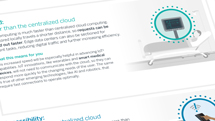Auto logout in seconds.
Continue LogoutThis is not a blog about a Natalie Portman movie. It's about Covid-19—and I can explain why.
While public health experts learned important lessons when responding to other large-scale outbreaks like Ebola, SARS, and H1N1, Covid-19 still caught many off guard.
3 imperatives to leverage telehealth against Covid-19
When people heard about the early signs of the new coronavirus spread in China, most did not expect it to lead to locked borders, massive unemployment, empty store shelves, and social distancing measures. There is a term for such events that come as a surprise and have a major impact: "black swan events."
What defines a black swan event?
A black swan event is a term popularized by Nassim Nicholas Taleb, a professor, author, and former Wall Street trader. This term is a metaphor, stemming from how humans used to think all swans must be white since that was all that could be confirmed by empirical evidence. However, when European explorers landed in Australia in 1697, they discovered black swans living there, instantly disrupting a long-standing system of thought.
According to Taleb, black swan events have three main attributes:
- They are rare or highly improbable;
- They are extremely impactful; and
- They tend to be treated as an explainable or predictable event after the fact.
Ultimately, black swan events change the course of history—for better or for worse, and sometimes for both. Some examples of black swans include the 2008 global financial crisis, various scientific discoveries, the 9/11 attacks, or the start of the internet. And now, this theory is getting renewed attention with the appearance and spread of Covid-19, as it has brought the global economy to a halt and has implications that could change many aspects of social life moving forward.
In a previous blog, we wrote about numerous ways technology can be used against Covid-19, and how early technology adopters are likely to have an advantage in combating the pandemic. This entry is focused on how Covid-19 will impact digital health startups throughout 2020.
How digital health startups will fare the rest of this year
The reality is that Covid-19 will boost demand for some technology companies and sound a death knell for others.
The researchers at Rock Health just released an analysis showing that digital health venture funding had its strongest start ever this year, raking in over $3 billion across the first quarter—that's more than 1.5 times the total funding in the first quarter of any previous year they've tracked. But this record-breaking first quarter is unlikely to sustain itself throughout the rest of the year. Many startups across industries have already started to readjust revenue forecasts, lay off employees—and will likely postpone any anticipated IPOs for the year.
Now that investors and health care organizations are tightening their grip on cash flow, the bar is suddenly much higher for startups to prove their value proposition. For example, the Silicon Valley venture capital firm Sequoia Capital sent a memo to various CEOs in early March stating, "Coronavirus is the black swan of 2020," and suggested to these CEOs that they reevaluate every assumption about their business (e.g., planned fundraising, sales forecasts, marketing).
Digital health funding will certainly take a blow in 2020, but companies that operate in specific domains are likely to still see demand for their products and services, both during the pandemic response and in planning for future outbreaks. Further, many venture capital firms are still holding significant funds that have been raised, but not yet deployed (i.e., "dry powder"), meaning that investors have "stocked up" to take advantage of a bumpy year as a proving ground for digital health startups.
A new age of 'digital Darwinism'
Taleb notes that while black swan events are unpredictable by nature, organizations should still account for uncertainty in their future planning to build resiliency against the "unknown unknowns." In fact, while ordinary market analysis would exclude rare events, Taleb argues that to better understand our world, we should start with these outliers, given their significant cumulative effect on "normal" events.
Relating this to health care, Taleb states, "[How] can we understand health without considering wild diseases and epidemics?" In essence, we learn the most about people, processes, or systems when we test them under severe circumstances.
What this also means is that sometimes it takes unexpected events to essentially "weed out" a market that has been flooded with vendors and solutions. It is those companies that have built a robust solution or who fill a crucial digital health need that will survive (and possibly thrive) in the post-pandemic environment.
Some examples of durable or "anti-fragile" application areas include:
- Data aggregation and analytics: Data underpins nearly all aspects of clinical decision support, predictive trending (and AI generally), real-time surveillance and reporting, capacity planning, and population health management. Any digital health startups that can draw value from raw data will continue to generate interest.
- Disease diagnosis and treatment: Learning about disease is the essence of medicine, and those startups that support medical research, advance drug discovery and development, and improve other aspects of precision medicine are well positioned to capitalize on the genuine promise of technology applied to those fields.
- Cloud computing and constant connectivity: Flexible, on-demand computing services and distributed networks are increasingly required for digital health, which bodes well for cloud and telecommunications providers. The stars have aligned to push telehealth into mainstream adoption, and the industry is also bullish on patient triage and screening tools (e.g., symptom checkers, chatbots), remote patient monitoring, and other connected devices to support patients in their daily lives.
Of course, digital health startups are competing with other players in these markets. Given the economic impact of Covid-19, and the immense time and money spent on EHRs, many health care organizations are hoping to draw out additional value from these existing investments before looking to contract with new partners.
The epidemic is also an opportunity for big tech firms to "earn their stripes" in health care. There has been a fair amount of scrutiny for these companies as they've made clear plays to enter the industry, but now the market is looking at big tech to leverage their resources and talent to deploy solutions quickly and at a national scale. For example, the White House recently announced its Covid-19 High Performance Computing Consortium, which involves IBM, Amazon, Google, Microsoft, and Hewlett Packard. This public-private consortium will likely lead to a number of future government contracts and funding for scientific research and development.
Ultimately, how digital health startups fare in the post-Covid-19 environment will depend heavily on expanded regulatory relief efforts, a redesign of approval pathways for new digital health devices, and reimbursement for digital services. But a silver lining of this pandemic is that it allows health care stakeholders to test their disaster plans (or realize they don't have one), and it exposes other technology roadblocks.
As health care leaders come out of this pandemic and learn from it, they will look to invest in companies that fill a crucial gap. Those digital health startups that outlast this pandemic will show that they are resilient against black swan events, and offer a value proposition that can withstand periods of uncertainty.
Your top resources for Covid-19 readiness
You're no doubt being inundated with a ton of information on how to prepare for possible patients with the 2019 coronavirus (Covid-19). To help you ensure the safety of your staff and patients, we pulled together the available resources on how to safely manage and prevent the spread of Covid-19.
Don't miss out on the latest Advisory Board insights
Create your free account to access 1 resource, including the latest research and webinars.
Want access without creating an account?
You have 1 free members-only resource remaining this month.
1 free members-only resources remaining
1 free members-only resources remaining
You've reached your limit of free insights
Become a member to access all of Advisory Board's resources, events, and experts
Never miss out on the latest innovative health care content tailored to you.
Benefits include:
You've reached your limit of free insights
Become a member to access all of Advisory Board's resources, events, and experts
Never miss out on the latest innovative health care content tailored to you.
Benefits include:
This content is available through your Curated Research partnership with Advisory Board. Click on ‘view this resource’ to read the full piece.
Email ask@advisory.com to learn more.
Click on ‘Become a Member’ to learn about the benefits of a Full-Access partnership with Advisory Board
Never miss out on the latest innovative health care content tailored to you.
Benefits Include :
This is for members only. Learn more.
Become a member to access all of Advisory Board's resources, events, and experts
Never miss out on the latest innovative health care content tailored to you.




